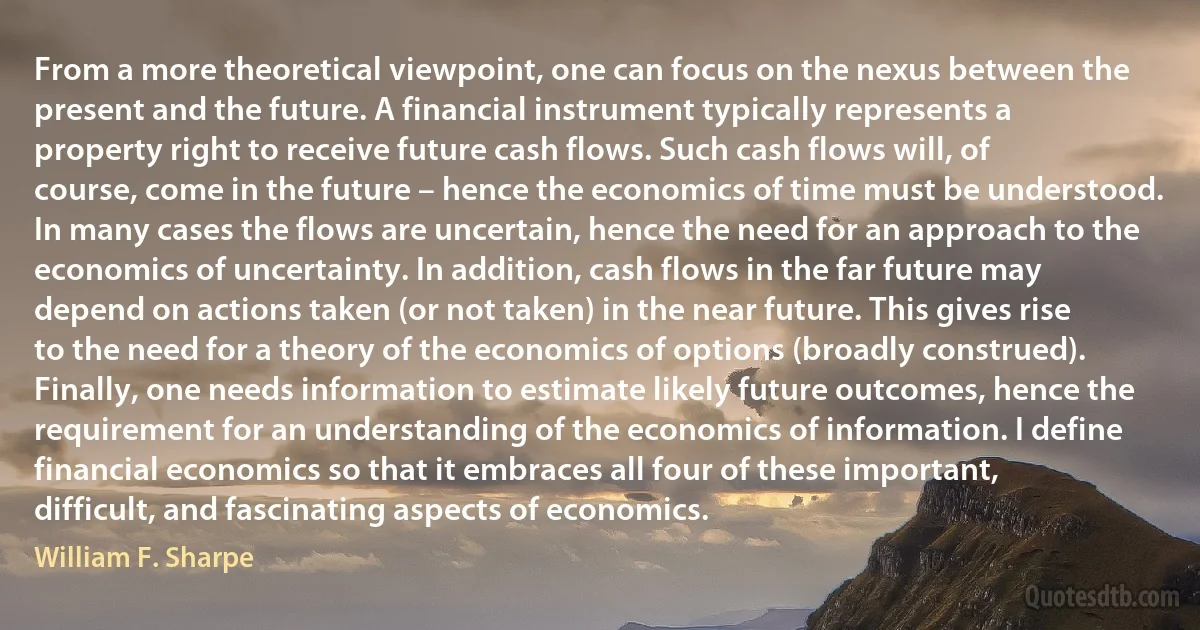
From a more theoretical viewpoint, one can focus on the nexus between the present and the future. A financial instrument typically represents a property right to receive future cash flows. Such cash flows will, of course, come in the future – hence the economics of time must be understood. In many cases the flows are uncertain, hence the need for an approach to the economics of uncertainty. In addition, cash flows in the far future may depend on actions taken (or not taken) in the near future. This gives rise to the need for a theory of the economics of options (broadly construed). Finally, one needs information to estimate likely future outcomes, hence the requirement for an understanding of the economics of information. I define financial economics so that it embraces all four of these important, difficult, and fascinating aspects of economics.
William F. SharpeRelated topics
approach course define economics far four future gives likely near need needs nexus present property receive requirement right rise take time uncertain understanding viewpointRelated quotes
Comets are flying around the solar system. As they near the sun, they develop a tail as material is blown off by the solar wind. Most astronomers agree that comets cannot be more than 10,000 years old. They would have completely disappeared by now. Some scientists have recognized this as a serious problem for the theory that the earth is billions of years old, so they have proposed a new theory that new comets are constantly being introduced into the solar system to replace the old ones that burn out. They say they are coming from the "Oort Cloud.” No one has ever seen this Oort cloud, Oort never saw the Oort cloud! There is NO scientific evidence for its existence, but in their mind, this answers the serious problem the short lives of comets creates. There is a simpler answer, of course: the universe is NOT billions of years old!

Kent Hovind
The social rootedness of science is often associated with the utility of applied science; this is an error and a dangerous error. But precisely the detachment of the theoretical scientist is rooted in the institutions of his society and in the evaluative choices which underlie those institutions. He can focus his whole attention, bringing every relevant clue to bear, on a problem wholly without appetitive or utilitarian implications, he can put his whole heart and mind into the search for understanding for the sake of understanding alone. How can he do this? First, because he himself has been nourished and disciplined by traditions cultivated within his society which have produced this kind of devoted attention to impersonal goals. And secondly, because the society itself, in its deepest foundations, respects those independently self-sustaining traditions of scientist or scholar.

Marjorie Grene
The need for a fundamentally different approach to the study of physical processes at the molecular level motivated the development of relevant statistical methods, which turned out to be applicable not only to the study of molecular processes (statistical mechanics), but to a host of other areas such as the actuarial profession, design of large telephone exchanges, and the like. In statistical methods, specific manifestations of microscopic entities (molecules, individual telephone sites, etc.) are replaced with their statistical averages, which are connected with appropriate macroscopic variables. The role played in Newtonian mechanics by the calculus, which involves no uncertainty, is replaced in statistical mechanics by probability theory, a theory whose very purpose is to capture uncertainty of a certain type.

George Klir
There is a great affinity in me with the Hindu genius - that mind, vast, imaginative, loving, dreamy and speculative, but destitute of ambition, personality and will. Pantheistic disinterestedness, the effacement of the self in the great whole, womanish gentleness, a horror of slaughter, antipathy to action - these are all present in my nature, in the nature at least which has been developed by years and circumstances. Still the West has also its part in me. What I have found difficult to keep up a prejudice in favor of my form, nationality or individuality whatever. Hence my indifference to my own person, my own usefulness, interest or opinions of the moment. What does it all matter? It is not perhaps not a bad thing,' he says, 'that in the midst of the devouring activities of the Western world there should be a few Brahmanical souls.

Henri-Frédéric Amiel
THEY who are acquainted with the present state of the theory of Symbolical Algebra, are aware, that the validity of the processes of analysis does not depend upon the interpretation of the symbols which are employed, but solely upon the laws of their combination. Every system of interpretation which does not affect the truth of the relations supposed, is equally admissible, and it is thus that the same process may, under one scheme of interpretation, represent the solution of a question on the properties of numbers, under another, that of a geometrical problem, and under a third, that of a problem of dynamics or optics. This principle is indeed of fundamental importance; and it may with safety be affirmed, that the recent advances of pure analysis have been much assisted by the influence which it has exerted in directing the current of investigation.

George Boole
